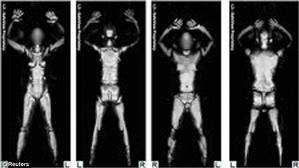Body Scanners And The Increasingly Aggressive Security Pat-Down
 Tuesday, November 16, 2010 at 9:10AM
Tuesday, November 16, 2010 at 9:10AM  Air travel just keeps getting better, doesn't it? If one anti-body scanner activist--the guy behind Opt Out Day, whereupon everyone will refuse to be scanned at airport security--gets his way, the day before Thanksgiving will become, not the busiest travel day of the year, but the most chaotic, delayed, frustrated, frazzled, and dreaded on the calendar.
Air travel just keeps getting better, doesn't it? If one anti-body scanner activist--the guy behind Opt Out Day, whereupon everyone will refuse to be scanned at airport security--gets his way, the day before Thanksgiving will become, not the busiest travel day of the year, but the most chaotic, delayed, frustrated, frazzled, and dreaded on the calendar.
The planned protest taps a growing unease over the full-body scans. Privacy groups such as the Electronic Privacy Information Center are seeking a court order to halt the use of invasive scanners, saying the scanners are illegal and violate passenger privacy. They also say the government has done little to ensure that images taken by the devices are not saved. (The Transportation Security Administration has asserted that the machines cannot store pictures, but security personnel at a courthouse in Florida were found to not only have saved images but shared them among colleagues in order to humiliate one of their co-workers.)
Scientists have also expressed concern that radiation from the devices could have long-term health effects on travelers.
Dr David Brenner, head of Columbia University's center for radiological research, has said that although the danger posed to the individual passenger is very low, he is urging researchers to carry out more tests on the device to look at the way it affects specific groups who could be more sensitive to radiation. Brenner said children and passengers with gene mutations - around one in 20 of the population - are more at risk as they are less able to repair X-ray damage to their DNA.
"The individual risks associated with X-ray backscatter scanners are probably extremely small," he told the UK's Daily Mail last winter. "If all 800 million people who use airports every year were screened with X-rays then the very small individual risk multiplied by the large number of screened people might imply a potential public health or societal risk. The population risk has the potential to be significant."
Although passengers have the right to opt out of going through a scanner, the TSA recently announced that passengers who opt out of body scanners at airport security checkpoints would be required to undergo an enhanced physical pat-down that would include agents using open hands and fingers to touch and press chest and groin areas of passengers. In the past, agents were instructed to use the backs of their hands for pat-downs.
 Kathy
Kathy
The Washington Post reports that the TSA now says if you refuse to submit to screening, you will not fly. Period. Here's the full story.
 Kathy
Kathy
The software programmer who opted out of a thorough security search at the San Diego airport last Saturday has already inspired the headline heard 'round the world: Don't Touch My Junk. The viral video came first. Obviously, the rap song is being remixed at this very moment and sweatshops are madly printing t-shirts.
 airport security,
airport security,  body scanner,
body scanner,  radiation,
radiation,  travel
travel 
Reader Comments